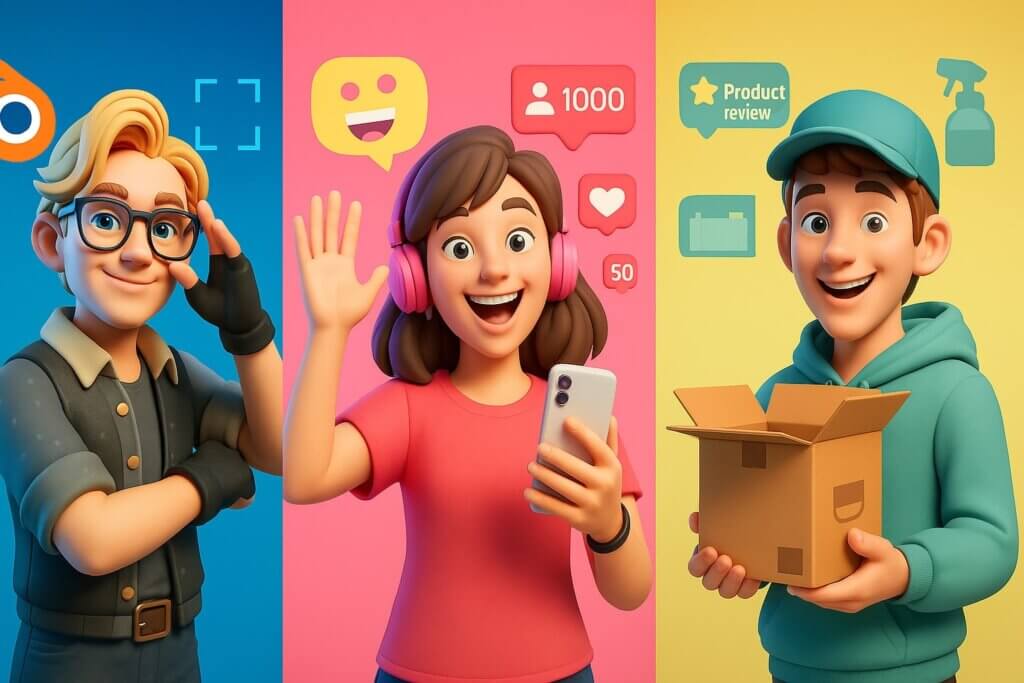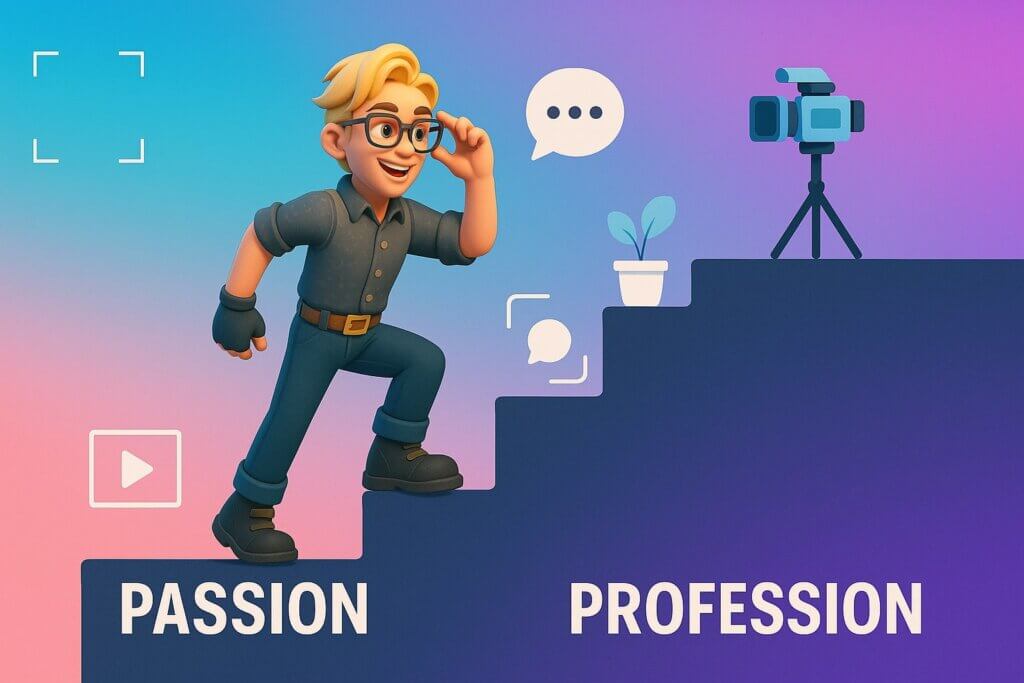How to Become a Digital Creator: Turning Passion into a Profession

pdated on March 28, 2025
We’ve updated the images and videos to enhance your reading experience.
Over 300 million individuals globally are digital creators, an element of the creative economy. They profit from expertise, creativity, and influence on popular platforms like YouTube, TikTok, and Substack. Creators are crucial middlemen as firms adopt micro-targeted marketing and audience-first tactics. They influence customer behavior, content, engagement, and innovation. Creators gain economic power in the digital-first era via decentralized income sources as blockchain and Web3 expand.
What Is a Digital Creator?
A digital creator is someone who produces and shares content across digital platforms, blending creativity with technology. From videos and blogs to podcasts and digital art, digital creators engage audiences in various ways. Some focus on traditional platforms like YouTube, Instagram, and TikTok, while others explore virtual worlds and 3D avatar creation to bring their ideas to life.
How Digital Creators Express Their Creativity
Digital creators work in multiple formats:
Video Creators – Editing cinematic travel vlogs, tutorials, or short-form content for social media.
Writers & Bloggers – Crafting engaging stories, industry insights, and educational articles.
Podcasters – Hosting discussions, interviews, and audio storytelling.
Virtual World Creators – Designing interactive 3D environments, custom avatars, and digital experiences in platforms like VIVERSE.
The Role of Technology in Digital Creation
Digital creators don’t just rely on creativity—they also use technology to enhance their work. Tools like Google Analytics, Hootsuite, and AI-powered design software help them optimize content and reach the right audience. As digital platforms evolve, creators continue to push boundaries—whether through traditional media or immersive virtual worlds that redefine online interaction.
Digital Creators vs. Influencers vs. UGC Creators

Digital Creators
Digital creators produce one-of-a-kind content with digital tools, which helps them to create whatever they want. For example,E.g., they can create 3D renders for campaigns or edit videos much like they would for YouTube. They focus on storytelling across platforms, using technical skills such as motion graphics, or sound design, and narrative insight. Also, their content is independent of the platforms: they are built to perform well on services like Instagram, YouTube, or your website.
Influencers
Influencers make use of an established audience’s trust to share product narratives. For example, tech influencers may showcase a new gadget while incorporating it into their everyday lifestyles, helping to influence buying decisions.Much of data analytics relies on engagement rates and click-through rates to spot the success of the campaigns. Further, many influencers will line up platform-specific algorithms, like TikTok’s ‘For You Page’, to achieve maximum visibility.
UGC Creators
The UGC creators craft relatable content that brands can take and repurpose. Say, for instance, they may use their smartphones to film unboxing videos while remaining authentic and meeting the brand requirements. Often their content cuts past the polished look, instead opting for natural lighting and regular backdrops. Additionally, given that UGC follows trends like short-form videos on TikTok, it’s easier for brands to test audience reactions to campaigns before scaling.
Steps to Transition Your Passion to a Profession as a Digital Creator

- Discover Your Niche: Reflect on your passions, abilities, and any expertise you may have. Analyze market gaps and trending niches to find where your skills fit. Use Google Trends or AnswerThePublic to know and understand audience demand. Create content that blends your interests with opportunities.
- Choose the Right Platforms: Each platform tackles specific content formats and audiences, though there is flexibility within each. YouTube is good for long-form content, like tutorials, in-depth reviews, animated stories, and more, while Instagram and TikTok are good for short-form content and visuals. Evaluate each platform’s algorithm and monetization policies. Experiment, then narrow down to those with maximum engagement for your niche.
- Invest in Tools: Invest in Tools: High-quality content requires professional-grade tools, but you can find options for various budgets. For lower-budget, high-quality alternatives, consider using smartphones like the iPhone 14 or Google Pixel 8 for video production, and DaVinci Resolve for free, robust video editing. For higher-tier tools, invest in versatile cameras like the Sony A7 series and professional editing software like Adobe Premiere Pro or Final Cut Pro. Explore platforms like Trello for content planning and Grammarly for writing assistance.
- Develop a Content Strategy: Plan content that solves audience issues or entertains. Use Notion or Asana for scheduling posts. Analyze industry trends and pivot strategies. Track engagement to know which formats perform best on how to become a digital creator.
- Build a Community: Raise a loyal audience while replying to comments and hosting Q&A sessions. Utilize Discord or Patreon to create exclusive spaces. Offer value consistently, whether through free resources, live tutorials, or engaging stories.
- Monetize Your Content: Diversify income streams early. For example, you may create digital products, offer consultations, or license your work. Patreon or Ko-fi can help build recurring revenue. Understand advertisement revenue mechanics and seek partnerships that support your niche to maximize how to become a digital creator.
- Master SEO and Analytics: SEO gives visibility. Learn keyword research using Ahrefs or SEMrush. Optimize titles, descriptions, and tags. Google Analytics is used to track web traffic, and YouTube Analytics is used for video performance. They can help refine strategies.
- Collaborate Effectively: Identify creators and brands that complement your style. Use a tool to pitch collaborations. Create win-win partnerships while defining goals and deliverables. Joint ventures can broaden your audience and build credibility.
Challenges Digital Creators Face

Navigating Creative Blocks
Creative blocks are normal, but they can be very disruptive. Use structured ideation techniques such as the SCAMPER framework (Substitute, Combine, Adapt, Modify, Put to another use, Eliminate, Rearrange). Think of an older project and try combining one of the SCAMPER principles to breathe new life into it again. Plus, schedule ‘input days’ where you plunge yourself into unrelated creative fields (e.g., architecture, film) to start cross-domain brainstorming.
Constructive Responses to Online Criticism
Negative feedback online is likely, but you don’t have to take it personally. Instead, channel it
into productivity by using the feedback to improve your work. So, use tools such as sentiment analysis (e.g., MonkeyLearn or Google Cloud Natural Language) to filter out valid feedback from noise. To validate, consider a live Q&A to answer concerns openly. Use preset keywords and comment moderation tools to help reduce and block negative comments and toxic discussions.
Adapting to Algorithm Shifts
Algorithms keep changing, but adaptability is key. Look for analytic tools such as Chartbeat or Social Blade to see what sort of content is trending and what’s happening with platforms. Tomaintain visibility across the platforms, diversify content formats—e.g. transition blogs intointeractive infographics or videos. What is more, try to reduce your over-dependence onalgorithm-driven platforms while engaging audiences via owned channels like email lists.
The Imperative of Continuous Learning
Upskill yourself in automation & any AI-driven tools like Jasper for writing and MidJourney for visual content to stay relevant. If you’re on a platform and unfamiliar with the metrics or editing software updates, enroll in modular courses. Set up a ‘reverse mentoring’ relationship with a younger creator and keep up to date with grassroots trend s and new platforms like BeReal.
How VIVERSE Helps Digital Creators Stand Out
VIVERSE Create, a web-based platform that lets users create rich virtual worlds without coding,helps digital creators succeed across devices. VRM standards enable customization and cross-platform interoperability in our avatar system. Sketchfab integration simplifies creation with amassive 3D model collection. Apart from that, our platform supports interactive events and seminars, promoting community participation. For brand collaborations, VIVERSE for Business helps establish branded virtual worlds to improve consumer connection.
VIVERSE Create v1.0, a browser-based, no-code platform, lets you create and share dynamic,
multiplayer virtual worlds across devices. PlayCanvas integration simplifies 3D environment
design for digital projects. Also, our avatar creation tools accept VRM format imports for full
digital identity customization. A complete set of 3D, avatar, VTuber, and AI tools for virtual world content makers is also available. In addition, we provide VIVERSE points, which you may earn via different activities and redeem for rewards to expand your creative potential.
We invite you to join our enthusiastic and growing community of creators and shape digital
experiences together, with VIVERSE Create.
And make sure to join our VIVERSE Discord community for the latest news on releases and
events, and to exchange tips and tricks with your fellow creators!